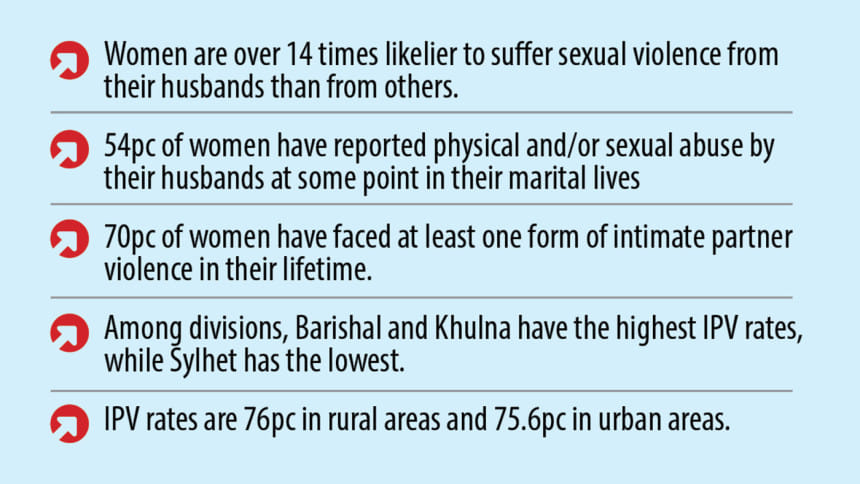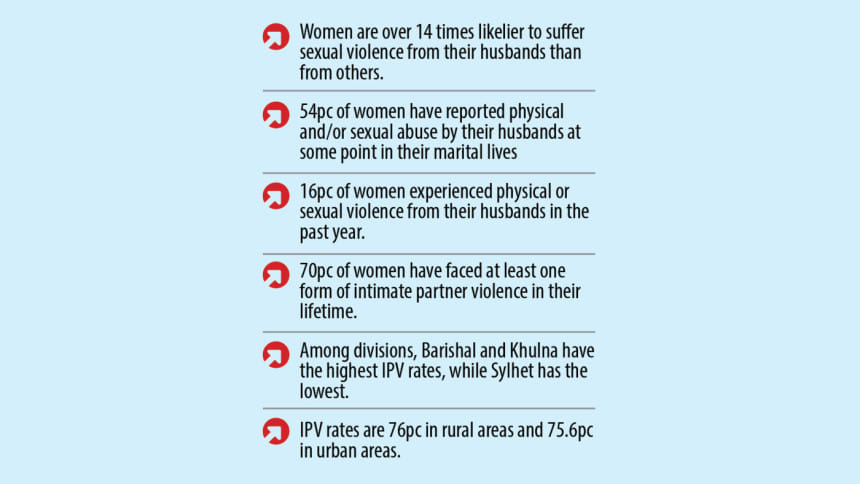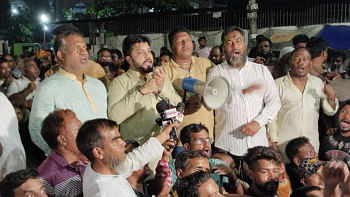Violence against women: Most victims abused by husbands

Women in Bangladesh are three times more likely to be physically abused and over 14 times more likely to suffer sexual violence from their husbands than from others, according to a Bangladesh Bureau of Statistics survey on violence against women.
Over half of all women surveyed (54 percent) have reported physical and/or sexual abuse by their husbands at some point in their marital lives.
The Violence Against Women Survey 2024 -- based on interviews with 27,476 women -- reveals that intimate partner violence (IPV) remains widespread, with 70 percent of respondents experiencing at least one form of abuse, including physical, sexual, emotional, economic violence, or controlling behaviours, at some point in their lives.

In the past 12 months, 41 percent of women reported being abused by their intimate partners.
In comparison, the figures were 73 percent for lifetime prevalence and 55 percent for past-year prevalence in the 2015 survey.
The survey stresses that intimate partner violence is more prevalent than non-partner violence. For the purpose of this survey, "intimate partners" are defined as current or former husbands, and "non-partners" are those other than a current or former husband with whom the respondent has had contact since the age of 15.
BBS Project Director Iftekhairul Karim presented the study, prepared in collaboration with UNFPA, yesterday at the BBS auditorium in the capital's Agargaon.
According to the study, 76 percent of women in rural areas and 75.6 percent in urban areas face IPV.
Among divisions, Barishal and Khulna have the highest IPV rates at 81.5 percent, while Sylhet reports the lowest at 72.1 percent. In Dhaka, the IPV rate is 72.9 percent, in Chattogram 78.5 percent, in Mymensingh 75.1 percent, in Rajshahi 74.5 percent, and in Rangpur 74.1 percent.
The study further showed that the most prevalent forms of IPV were controlling behaviour and emotional violence, highlighting psychological abuse as a critical concern.

This landmark national survey -- the third of its kind, following studies in 2011 and 2015 -- offers comprehensive and up-to-date insights into the scale and impact of violence against women in Bangladesh, BBS officials said.
The findings are based on UN standard measures widely used for global monitoring of violence against women.
Despite the high prevalence of IPV, the survey found that 64 percent of victims never shared their experiences with anyone. Only 7.4 percent seek legal action, while 93.6 percent do not.
This silence stems from factors such as a desire to protect family reputation, concerns for their children's well-being, and the perception that such violence is "normal."
The survey also highlighted significant disparities in vulnerability, with women in disaster-prone areas at higher risk of IPV -- both in their lifetime and in the past 12 months.
BBS Director General Mohammed Mizanur Rahman, who chaired the event, said, "The survey is vital to understanding violence against women in the country. With previous surveys in 2011 and 2015, this third iteration in 2024 reaffirms Bangladesh's leadership in South Asia on this critical issue.
"This household-based survey interviewed 27,476 women across urban, rural, disaster-prone, and slum areas, incorporating qualitative data for the first time. By capturing the experiences of women aged 15 and above, from both intimate partners and non-partners, the survey provides invaluable insights to shape policies and interventions to end violence against women."
Aleya Akter, secretary of BBS's statistics and informatics division, highlighted the survey's role in strengthening gender statistics.
"The 2024 Violence Against Women Survey provides essential data to track SDG-5, including key VAW indicators for Bangladesh's Voluntary National Review at the UN High-Level Political Forum in July 2025. This data will guide national efforts to enhance response and drive action to end violence against women."
Women and Children Affairs Adviser Sharmeen S Murshid stressed the importance of quality data in policy-making.
"This survey is crucial for developing evidence-based strategies to eradicate violence against women and build a gender-equitable, discrimination-free society."
UNFPA representative Masaki Watabe praised the strong collaboration between BBS and the women and children affairs ministry.
"This report is more than just statistics—it is a vital tool for developing evidence-based strategies to combat violence against women. While some progress has been made, we must intensify efforts and invest more in ensuring that every woman and girl in Bangladesh can live free from violence."

 For all latest news, follow The Daily Star's Google News channel.
For all latest news, follow The Daily Star's Google News channel. 









Comments